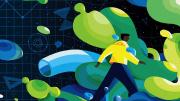I am still in high school in Botswana when I hear that physicists in Geneva flashed beams of particles round a town-wide circle, smashed them together, and found God. It isn’t God. What they actually found in the Large Hadron Collider is something called a Higgs boson particle. When we find out about it on the Internet, my best friend and I jump up, high-five, and hug each other like we contributed work toward this discovery, like we found something strange and new about the world around us. Three years later, I come to Harvard. I enroll in Physics 15a, “Introductory Mechanics and Relativity.” It feels as if I am leaping toward something. I fall. I fall very hard and I fall very fast.
I am a poor student when the romance disappears. I expect to see wonderful things in my professor’s blackboard scribbles, and I can’t. I want the numbers to be beautiful. I want them to make sense. I want to see. I simply do not possess the imagination. And when the equations fail to yield the interesting phantasms promised to me by Neil deGrasse Tyson space documentaries or colorfully bound Stephen Hawking books, my body fails to hold up my head and I try my best not to snore during lecture. I am not even bored; I am simply exhausted after being up at Physics Night from the previous evening until the early blue hours of this morning.
Physics Night takes place every Wednesday in the Leverett House dining hall. It is typically populated by a small sea of clumsily dressed adventurers with their coffee cups and cookies, prepared by the dining staff specially for this night-long grind. I hang around with them and as one of them, still haplessly convinced that I, too, can become a physicist. It is hard to tell whether I enjoy the togetherness of our struggle, with our mythical-looking equations and our approximations of cows as spherical objects. It is not hard to tell that I don’t enjoy the work. At some point in the night, our laughter isn’t enough to suppress our tiredness. My mind refuses to consider how trains can move at near-light speeds for the purposes of the second question of my eighth problem set. My mind instead travels elsewhere on its own and notices things.
I do not notice the things I am supposed to: say, how one kind of sum plays with how much force one object exerts on another. I look at other things—like paper, like thought. One of my classmates’ solutions for his problem set is aligned elegantly, line after line like a perfect music score on his clean white sheets; my attempts jump from one scribble or diagram to the next in spectacular, nonlinear fashions. Some students stew in silence and stare at their books. Others, like me, fidget constantly and stumble away from our chairs, touch things and swivel pens and play with our hair and tap our fingers on the table. Why are we all so different? I decide to leave because I am paying more attention to people instead of particles. I walk back home to Wigglesworth C. It is 4 a.m. and dark and soft outside. I look up a little to see the stars burning and wonder how they do so. Maybe I can calculate it. I shower and go to bed.
Freshman fall feels long and hard, but Harvard begins to move unbearably quickly despite my mental protests. Freshman spring I take two astrophysics classes and shiver in the observatory atop the Science Center during lab nights. I look a lot at the mute-glowing campus below and fail to learn anything new about stars. Sophomore fall, I heap my shopping-week schedule full of courses that have nothing to do with physics. I shop classes violently, across whatever fields I can imagine myself in, maybe philosophy or literature or math. Nothing quite fits. Laptop on lap after some class, I randomly click across the course-search tool on my.harvard.edu. The screen says that Psychology 2451, “Psychology of Racism, Prejudice, and Discrimination,” is only a few footsteps away on the fourth floor of William James Hall. I make the walk.
The undergraduates say that William James is ugly. It is the tallest building on campus. It is white and consists of 14 stories of pale rectangle with long rows of windows. The departments here include social studies and sociology, but most of the building is occupied by psychology, which has offices and classrooms rising from the fourth floor to the thirteenth, and elsewhere. Its careful partitions of room and window into box and square reflect a particular dream of what the mind looks like to some cognitive theorists. They envision the mind as a perfect, mechanized machine, consisting of cogs and gears grinding toward thought. In William James, they don’t think much of spirits, of souls, or of Freud. They don’t think of our Selves as shadowy threads that can be pulled from our life histories like cobwebs from cabinets.
I like this building. I like this psychology class. I like the professor who teachers it, who says “Well, I think you’ll be just fine,” when I ask him about taking this graduate seminar without having done any of the prerequisites. I like the way he presents his theories that generalize racism into neat packages. In my past semesters I avoid classes in which I must talk about my skin. I am angry enough. To know the details of the slave ships’ wood, of how the hatred toward us is legalized and systematized to the banality of culture, of the bodies hanging on trees—no. I’d rather not. I already know too much without having learned much about it through books, through classes. Yet I am here. I am listening to my professor talk about my skin. He talks about the programs that we might have in our brains, developed through millennia of evolution, that lead us to say things like, “This person is black. This person is different. This person is not a Person,” and I feel warily safe. I hope that maybe if we know why this all happens in the first place, we can fix it. Maybe I can’t know about particles; maybe I can know about this. The professor’s skin is like mine. Sophomore fall, I declare a concentration in psychology.
I learn that psychology is a young science. Psychologists have not yet acquired the fancy empiricism of physicists, though they try. In the place of large hadron colliders, they have statistics and sometimes MRI machines. Thinking about thinking is troublesome. It takes all sorts of tricks to try understanding people’s heads. There is disagreement on how to use these tricks. Some psychologists are friends with the neuroscientists. They wish to split open our skulls and finger the folds of our brains—our wet pink mush—and know us by the lightning pulsing through the neurons of our mental architecture. Some psychologists play with those few remaining philosophers who say that there’s something transcendent about us. They claim that our Selves cannot be found in our brains. Others like to think about people as computers: our brain is hardware, our mind software. Maybe some people think like physicists because nature built their CPUs a certain way. Maybe people from different countries had different programs installed in their heads by their parents.
The brain-as-computer analogy seems dehumanizing to me. That, or I don’t know how to process information the way I should. One night back in freshman spring I tried studying in Lamont, the main undergraduate library, and a familiar restlessness returned to my body. I fidgeted and walked around. I accomplished nothing. I noticed everyone else. They sat in their cubicles, in rows and rows, typing and paper-shuffling and nose-sniffling and eyebrow-furrowing and draining coffee cups: the small things that all sum up to the steam of academic concentration. Perhaps, inside themselves, they struggled, too. I could not see this. I saw them sit down and just do it: whatever they had to do. I left Lamont thinking of the red pods in The Matrix films where all of humanity is plugged in and bubbled into energy for maleficent artificial intelligences. And I thought of server-rooms in the basements of big corporations, each little computer whirling its CPU fans and hard drives to become fantasy thoughts that fly through the air into our little cellphones, on which we type up our own small fantasies.
Psychology is a good choice for me, since I can’t seem to avoid seeing mind-body problems in the form of college students working in libraries. I care about people, I care about minds. Psychology is a useful way of organizing this care. It is now sophomore spring. Schoolwork still bothers me (midterms, deadlines; morning classes), but at least I’m now anxious and interested instead of just anxious. The psychology department decides that I need to take Science of Living Systems 20, “Introduction to Psychological Science,” before I can do anything else in William James. Our lectures on Monday afternoons are fun, though a little long. On other days, we have small sections led by teaching fellows. My first one of the semester is held in Lamont. On my way to the second-floor classroom, I pass by the rows and rows of other students plugged into cubicles who are silently and efficiently processing information and I think of The Matrix again. In section, our teaching fellow produces a human brain from a blue cooler box and we pass it among our black-gloved hands. That brain was a person once, maybe. Or not: the teaching fellow asks if all we are is our brains. We talk about what would happen if you put Person X’s brain (an African boy) into Person Y’s body (an American girl). Would Person X be the same person? No, we think, and we somewhat all agree, but we’re also holding a brain without a Person and hoping to find Someone there.









